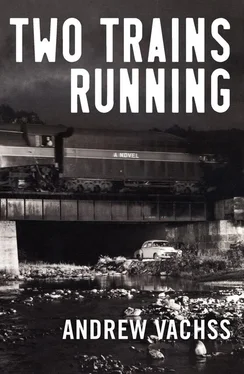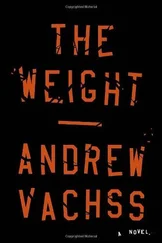“I don’t understand,” the doctor said, stifling a yawn.
“He had his wallet on him. And the car was registered to him, too. Plenty of ID. We know who he is.”
“So ask his-”
“He’s got no family around here. No blood family, anyway. But we knew his name. He works for Dioguardi.”
“I don’t know who that is,” the doctor said, his tone maintaining the distance between his world and the cop’s.
“He’s a gangster, Doc. Set up shop here a while back. We’ve been watching him, but, so far, he hasn’t tried to move in on any of the local people.”
“What does any of this have to do with-?”
“Anytime we find a guy lying in the street with his head bashed in, first thing we do is check to see if he’s still got his wallet. That neighborhood, you have to figure he was rolled for his money. There’s a club a couple of blocks away. Guy staggers out of that joint, drunk, there’s men in this town would be on him like vultures on a corpse.”
“But he still had his wallet…” the doctor said, drawn in despite himself.
“An empty wallet,” the detective said.
“So maybe he was robbed.”
“Who’s going to brain a guy, snatch his wallet, remove all the money, and then put the wallet back?”
“People do strange things,” the doctor said, returning to the disengaged distance he preferred.
“Yeah. And one of those things is gamble. He wouldn’t be the first man to walk out of a club Tap City.”
“Tap City?”
“Broke.”
“Yes. I understand there are a couple of places around here where it’s possible to gamble.”
“Yeah. Just the way you want it,” the detective said, reacting to the doctor’s snide tone.
“The way I want it?”
“That’s right. You, the good citizens of Locke City. You want folks to be able to play cards, have a drink, have a good time with a girl who isn’t going to tell anyone about it. And what you want from us, from the police, what you want is for us to keep the animals in their cages. You don’t want them breaking into your houses, stealing your cars, raping your wives. And we do that. We do it good.”
“Is that so?”
“You know it is. Locke City’s a border town. If you were in my business, you’d know what that always means. There’s things people want to do, they’re going to do them. And they’re going to come to wherever they can do them. The factories closed up a long time ago. And they’re not coming back. But we’ve still got good roads to drive on. We’ve got nice schools for our kids. The crime rate-the real crime rate-is one of the lowest in the state.”
“You sound like you should be running for office.”
“People like you make me tired,” the detective said. “You like to pretend you don’t know what fuel this town runs on. But you’re happy enough that your taxes are so low.”
The doctor raised an eyebrow theatrically. “So, if the tax rates were increased, then the sort of… vice you’re describing would all go away?”
“Go away? No. Move away, maybe, but never disappear. Every time the government tries something like that, they just make things worse.”
“Enforcing the laws would make things worse?” the doctor baited the detective, enjoying himself. This would make a wonderful story for his wife’s dinner party on Saturday.
“You think medical school’s the only place they teach sarcasm?” the detective said, dropping the temperature of his voice. “It takes money to run a criminal organization. I don’t mean Bonnie and Clyde stuff, I mean a business. A business that owns a lot of busi-nesses. Did you watch the Kefauver hearings? A criminal organization can’t go to a bank for financing. And they can’t rob enough of them, either. Prohibition, that was their financing. And that was when they started to organize, branch out, take over things.”
“We haven’t had Prohibition in this country for-”
“Prohibition doesn’t have to be booze, Doc. It just means something you’re not allowed to do. See, there’s two kinds of crimes. There’s the ones everyone agrees you shouldn’t do: murder, rape, arson… And there’s the ones everyone says you shouldn’t do, but they don’t mean it. I’m talking about fun, Doc. And not everybody’s got the same idea of what fun is. One guy spends his money deer-hunting, another spends it in whorehouses.”
“And because of your limited resources…”
“We have to concentrate on the crimes the citizens really care about, sure. But even if we had a force five times the size we’ve got now-”
“A better-paid police force, I trust?”
“You have a point you’re trying to make?” Sherman Layne said, his voice hardening perceptibly. “I must be missing it.”
The doctor suddenly remembered some of the things he’d heard about Sherman Layne around the hospital. Buying time to craft his retreat, he took off his glasses and fussily polished the lenses on a monogrammed white handkerchief. “The only point that matters here is that there is no way to predict the course of an insult to the brain.”
“Are you trying to-?”
“An ‘insult,’ Detective,” the doctor said, twisting his upper lip. “As in ‘insult and injury.’ We can’t look inside this man’s head and determine the extent of damage to the brain, much less whether it will be permanent. He experienced extreme blunt-force trauma to the skull. This caused what is known as a contrecoup injury. The blow caused the brain to move forward at high speed, and impact the cranial wall. Some patients recover completely. Some recover physically, but they experience short-term memory loss. If that’s the case here, this man would recall who he is, but would have no memory for the period of time in which the attack occurred.”
The doctor took a professional breath, then said, “Some never come out of a coma. They remain in a persistent vegetative state, dependent on medical personnel and machines to keep them alive. Some die. Their internal systems simply shut down. This man is breathing on his own, which augurs in his favor. Beyond that, there is nothing I can tell you. Now, if you’ll excuse me, I have rounds to complete.”
1959 October 01 Thursday 15:33
“What are we supposed to do with this?” Beaumont asked Dett, holding up the driver’s license of Nicholas Carlo Perrini.
“Not ‘we,’ me. I’m going to mail it to the people who’ve been sending that punk around to collect from your accounts.”
“Why just the license?” Beaumont asked, genuinely interested.
“A town like this one, the cops are going to say he was robbed anyway.”
“Because his wallet-”
“-will be empty, once they get done with it, right? That’s why I smashed his watch. If I hadn’t done that, the cops might have taken that, too.”
Beaumont shifted position in his wheelchair, reached for his cigarette case. “When Dioguardi gets the license, what’s he going to think?”
“He won’t know what to think,” Dett answered, “but he’ll know for sure it wasn’t any mugging. Getting the license in the mail, he’ll know it’s a message, from someone who knows what this Nicky boy was doing last night. And who he was doing it for.”
“What’s the point of that? He already knows we’re on to him; you can’t keep collections a secret.”
“Right. So, when he started edging in, that was sending you a message, wasn’t it?” Dett said.
“You’d think so,” said Beaumont, “but you know what he’s tapping? Nickel-and-dime action. Armand’s, that diner where you saw him? They’re paying him twenty dollars a week. Some of the clubs, maybe a little more. Place like Fat Lucy’s-that’s a candy store, where the kids hang out-probably no more than a ten-spot. But then there’s that business with Hacker, I told you about it. If all that adds up to some kind of message, I can’t read it.”
Читать дальше












